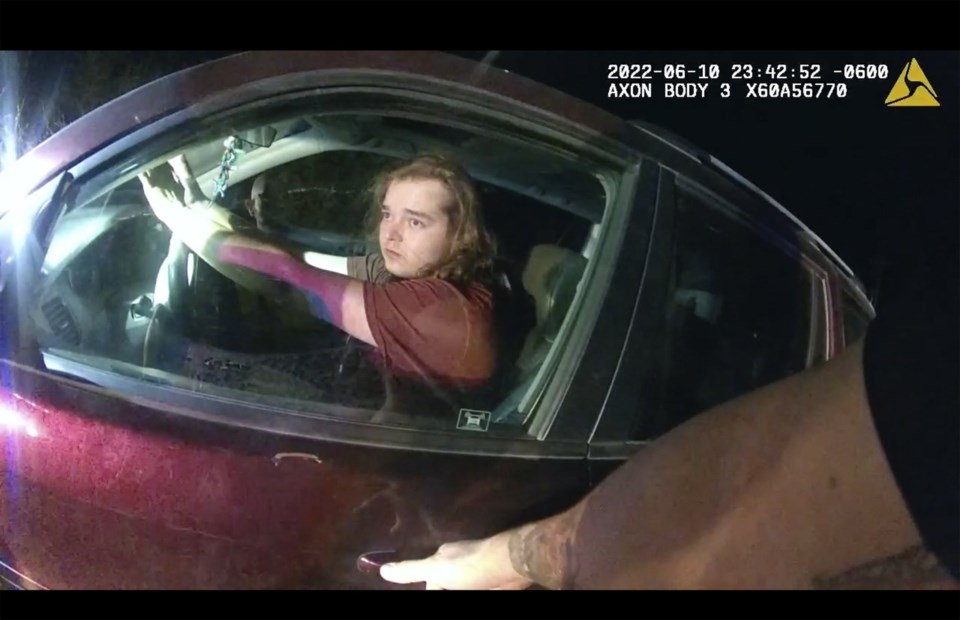DENVER (AP) — A former Colorado sheriff’s deputy was convicted of criminally negligent homicide Thursday in the shooting death of a 22-year-old man in distress who called 911 for help after his car got stuck in a small mountain community.
Jurors stopped short of finding former Clear Creek County Deputy Andrew Buen guilty of the more serious charge of second-degree murder in the June 2022 death of Christian Glass, which drew national attention and led to changes in how officers are trained to respond to people in mental health crises under a $19 million settlement with his family.
The jury had the option to convict Buen on the lesser charge of homicide, which carries a sentence of up to three years in prison.
As the verdict was read, Buen stood with his head bowed, flanked by his attorneys. He was later taken to jail, where he will stay until he is sentenced April 14.
Murder convictions against officers are rare, and the decision in Buen's case follows a long trend of officers avoiding harsh punishment for actions taken while they were on duty. Jurors delivered murder convictions against police only nine times in the U.S. over the past two decades, according to criminal justice expert Philip Stinson at Bowling Green University.
Thursday’s verdict “is a typical result that we see. It’s not uncommon that in these cases an officer will be convicted of a lesser offense, if convicted at all,” Stinson said.
Nevertheless, Glass’ mother said, she hoped it would stop a similar tragedy from unfolding in the future.
“Our son was murdered and we pray that today’s verdict prevents another family from suffering as we have,” Sally Glass said in a statement.
Prosecutors alleged that Buen needlessly escalated a standoff with Glass, who showed signs of a mental health crisis and refused orders to get out of his SUV near Silver Plume, a small former mining town along Interstate 70 in the Rocky Mountains west of Denver.
The defense argued that Buen was legally justified in shooting Glass, who had a knife, to protect a fellow officer.
“Murder was never the appropriate charge in this case and we are grateful to all of the jurors for recognizing that,” defense attorney Carrie Slinkard said, adding that the case would have implications for law enforcement statewide.
This was the second trial for Buen. Nearly a year ago, another jury convicted him of misdemeanor reckless endangerment for putting other officers in danger by opening fire but could not reach agreement on a murder charge and a charge of official misconduct. With the support of Glass’ family, prosecutors decided to try him again for second-degree murder alone.
While prosecutors did not completely agree with the latest verdict, Fifth Judicial District Attorney Heidi McCollum said it holds Buen accountable for Glass’s killing.
“The community could not be left with this hanging out there. They needed a resolution to Andrew Buen's actions. This trial was that resolution,” she said.
A second officer indicted in Glass’ death pleaded guilty previously to a misdemeanor.
After his SUV got stuck, Glass told a 911 dispatcher he was being followed. He also made other statements suggesting he was paranoid, hallucinating or delusional and experiencing a mental health crisis, according to Buen’s indictment.
When Buen and other officers arrived, Glass refused to get out. Video recorded by officers’ body cameras showed him making heart shapes with his hands to the officers.
The officers fired bean bag rounds and shocked Glass with a Taser, but that failed to make him exit the car. He then took a knife he had offered to surrender at the beginning of the encounter and flung it out a rear window, which had been broken by a bean bag, toward an officer, according to the indictment. At that point Buen fired five times at him.
“Lord hear me, Lord hear me,” Glass was heard saying moments before he was shot.
Sally Glass said her son had depression and was diagnosed with attention-deficit/hyperactivity disorder. She said he was “having a mental health episode” during his interaction with the police.
The $19 million settlement reached in 2023 was the largest in state history for a death involving the police. Clear Creek County, where Glass was shot, agreed to establish a crisis response team and for its sheriff’s office to train and certify all deputies in crisis intervention.
The state, which had three officers on the scene of the killing, agreed to create a virtual reality training scenario for the Colorado State Patrol based on the shooting to focus on de-escalation in stressful situations involving officers from different agencies. The program focuses on encouraging officers to intervene if they think a fellow officer is going too far or needs to step away from an incident.
Since 20005 there have been 205 cases of nonfederal law enforcement officers being arrested for murder or manslaughter resulting from on-duty shootings, according to a database compiled by Stinson and other researchers.
Of those, 68 were convicted of a crime. Nine were sentenced for murder with sentences averaging 18 years and ranging from 81 months to life, the researchers found. Several dozen cases are still pending.
Convictions on serious charges are rare because jurors are reluctant to second-guess the split-second decisions of officers in potentially violent encounters, Stinson said. That has not changed in recent years despite increased use of police body cameras and more attention from the public.
“I would have predicted a decade ago we'd see more convictions,” Stinson said. “But what we're seeing is business as usual in law enforcement. Policing does not change quickly.”
___
Brown reported from Billings, Montana.
Colleen Slevin And Matthew Brown, The Associated Press




